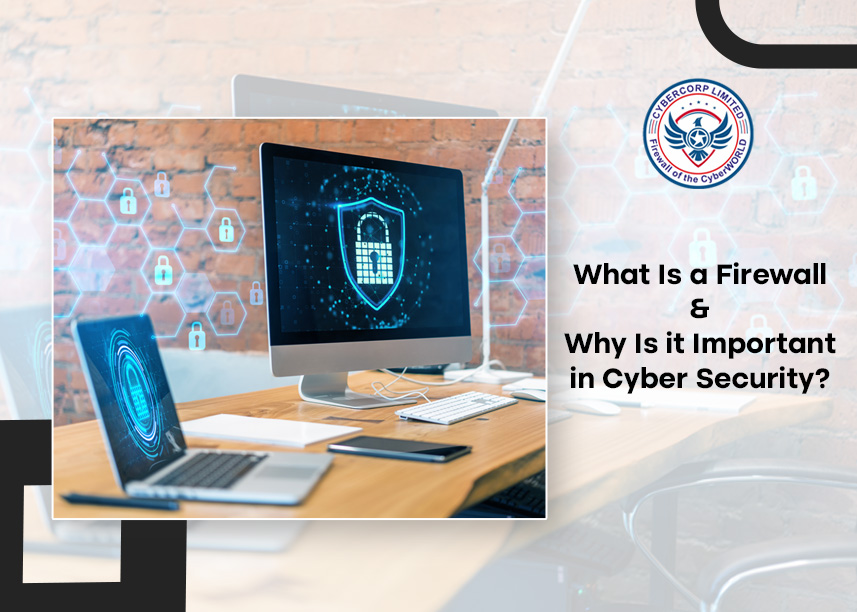
What Is a Firewall and Why Is it Important in Cyber Security?

In today's digital age, where cyber threats lurk around every corner, CyberCorp Limited stands at the forefront, championing cybersecurity solutions that safeguard digital assets. One of the fundamental pillars of this defense arsenal is the firewall. In this blog post, we'll delve into the multifaceted world of firewalls, exploring their critical role in cyber security and why they're indispensable for organizations worldwide.
Understanding Firewall in Cyber Security
Firewalls serve as the frontline defense mechanism, acting as a barrier between trusted internal networks and potential threats from external sources. They come in various forms, including hardware, software, and cloud-based solutions.
Key Functions of Firewalls
-
Filtering: Firewalls meticulously inspect incoming and outgoing traffic, applying predefined rules to allow or block data packets.
-
Packet Inspection: Through packet inspection, firewalls analyze data packets to determine their legitimacy, thwarting malicious attempts.
-
Stateful Inspection: Firewalls maintain the state of active connections, allowing for contextual decision-making to enhance security measures.
Importance of Firewalls in Cyber Security
Firewalls stand as the stalwart guardians of digital fortresses, essential components in the ever-evolving landscape of cyber security. In this digital age where connectivity is omnipresent, understanding the paramount importance of firewalls is imperative for organizations seeking to safeguard their digital assets from a myriad of threats.
Firewalls play a pivotal role in:
-
Protection Against Cyber Threats: They shield organizations from unauthorized access, malware, and other cyber attacks, ensuring network integrity and data confidentiality.
-
Safeguarding Sensitive Data: By controlling access, firewalls prevent unauthorized entities from compromising sensitive information.
-
Compliance Requirements: Firewalls aid organizations in meeting regulatory compliance standards, mitigating legal risks associated with data breaches.
Integration with Overall Cyber Security Strategy
Firewalls should be seamlessly integrated into an organization's broader cyber security strategy. They complement other security measures such as antivirus software, intrusion detection systems (IDS), and intrusion prevention systems (IPS) to form a robust defense mechanism.
Challenges and Considerations
Despite their efficacy, firewalls face challenges such as false positives, configuration errors, and advanced evasion techniques employed by cyber adversaries. Regular updates and maintenance are imperative to address these challenges and stay ahead of evolving threats.
Firewalls are indispensable guardians in the realm of cyber security, serving as the first line of defense against malicious actors. As organizations navigate the digital landscape, prioritizing the implementation and maintenance of firewalls is paramount. For comprehensive cyber security solutions tailored to your needs, get in touch with CyberCorp Limited today. By embracing firewalls as a cornerstone of their cyber defense strategy, organizations can fortify their digital infrastructure and mitigate the ever-evolving cyber threats landscape.
Categories
Trending Posts
-
Security Update
Supply Chain Cybersecurity: How to Secure Your Extended Network -
Security Update
A Guide to Endpoint Security: What You Need to Know -
Security Update
Top 10 Tools Every Cyber Security Professional Should Know -
Security Update
Exploring the Role of Ethical Hackers in Cyber Security -
Security Update
10 Practical Cyber Security Tips Everyone Should Know -
Security Update
How Blockchain is Revolutionizing Cybersecurity
Why CyberCorp is not a mere SPAC?

We are

CoOperative Corporate
Creates a commonwealth among the partners
Cumulative Growth safeguards against losses to one entity
We believe in

Organic Growth
Promotes growth within the group companies
Ensures Maximum benefits
We do

Integration
Horizontal integration of the various products
Creating new and more effective scalable solutions
© 2022-2024 CyberCorp Limited. All Rights Reserved.







.png)

